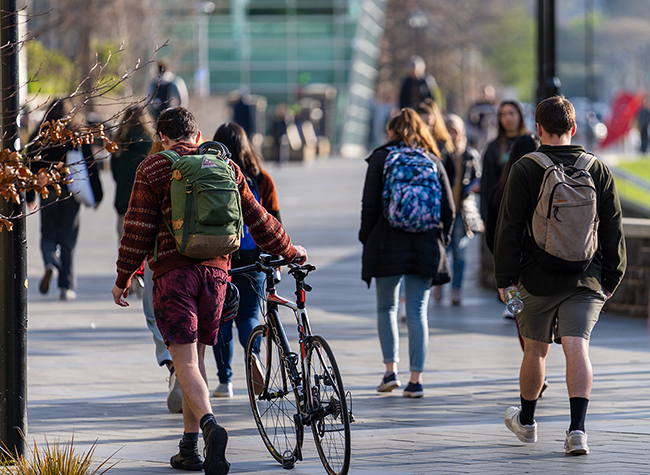Thursday 3 June 2021 8:27am

While Otago staff and students are increasingly walking, cycling, and using public transport or electric vehicles, a rising number of staff are also commuting alone in a vehicle, according to initial results from our University-wide travel survey.
The survey sparked responses from almost twice the number of staff this year – about 1800 – compared to 2019. All of Otago’s campuses were surveyed for the first time and 176 staff responded from those outside Dunedin. Students were also surveyed for the first time; 1657 responded from Dunedin and 152 from campuses.
The top three influences on how both staff and students choose to get to campus are the ‘most convenient option’, the ‘cheapest option’, or the ‘quickest option’, the survey results suggest.
For most undergraduates, the trip is less than two kilometres, while most staff travel further than that.
More than half of staff who responded drive a car alone or with passengers, while 41 per cent of postgraduates walk and more than 70 per cent of undergraduates as well.
Asked how they got to campus on 13 April, more than a thousand staff and students say they drove a car, motorbike, or motor scooter – 80 per cent of the fuel used was petrol, eight per cent diesel and 5 per cent pure electric (up from four per cent in 2019).
The Sustainability Office and Campus Development Division want to thank everyone who completed the 2021 Travel Survey.
“We use the survey to help us understand your travel needs and aspirations. The data tells us about the mix of travel modes,” Campus Development Division Strategic Resource Planner Kevin Wood says.
Insights from the survey will be used to help create a University travel plan and initiatives to help us all get to work more sustainably, Mr Wood says.
Sustainability Office Head Ray O’Brien says travel distance is used to calculate the carbon emissions from staff and student commuting. Those emissions are part of the University’s annual greenhouse gas inventory and help inform how we work towards both the University and Dunedin being net carbon zero by 2030.
The survey will also help identify peak travel times so possible congestion-reducing solutions can be investigated, he says.
Both the Campus Development Division and Sustainability Office are part of the Operations Group, which has three top priorities:
Enable – the University to achieve its vision and mission
Engage – with our students, each other, our customers and externally
Experience – of our students, our customers, and externally to be outstanding
